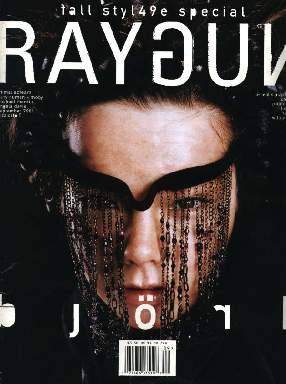|
Bjork Gudmundsdottir curls her feline body around a curtain and
asks in that hypnotic voice, "May I have some coffee, please?"
Her question moves through the photo studio like a command from a
child queen, sending a bevy of shaven-headed attendants springing suddenly
into motion, bringing forth carrot shakes, mineral water, and coffee. As bland
techno pumps loudly through the chilly studio, lights are adjusted, cameras
loaded, and Bjork prances gingerly into the public eye.
Taller and leaner than one would imagine, given her image as the Icelandic
elfin princess of pop, Bjork gives off an air of pure professionalism. Like a
cross between Greta Garbo and Betty Boop, she seduces the camera, staring
intently into its probing black eye, casting her curiously potent energies and
innocence with a faraway, though sexually-charged, gaze. Moving her hands
descriptively as if speaking some private sign language, she looks one minute
like an Egyptian queen, the next like a barefoot gypsy matriarch ready to explode
into a dance passed down from the middle ages.
Bjork the pop diva. Bjork the natural mother. Bjork the shrieking singer.
Bjork the fashion plate. Bjork the electronic maven. Bjork the future of right now.
She communicates a character and a knowledge that is centuries
old and seemingly wise at the same time that the telegenic presence bursting
through her music heralds th new and the not-yet-defined. The middle ages reached
through the virtuality of the information age. Part Nordic goddess, part giggly
ingenue, part visionary and part opportunist. Since unfolding her post-Sugarcubes
career with the albums Debut and Post, Bjork's exotic beauty, her distinctive
vocal style - augmented by an unpredictable tributary flow of growls, rasps,
chirps, and jazzy run-off scats - and her dead-on musical instincts have skipped
her music across boundaries worldwide, delighting her admirers and confusing
everybody else. As likel to croon a '40s swing tune as she is to create a
symphony of sound with weird percussion and evocative electronics,
Bjork has proven to be an adventurous media darling whose music lives
up to the hype.
|
Recently seen smooching and holding hands with producer-mixer
Howie B (most recently working with U2), Bjork has shown an eagerness
for mixing work with pleasure. Collaborators often become lovers,
Tricky and Goldie having also fallen under Bjork's magical mystery
spell. She is a passionate, emotional woman who invests her music with
the same commitment and energy she brings to her relationships. But as
with most who plunge headfirst into life, Bjork's inquisitive, all-embracing
enthusiasm can sometimes backfire on her.
Homogenic documents a cathartic transfiguration in Bjork's life.
A minimalist album of Bollywood-styled strings and bruising alien beats,
Homogenic signals, for Bjork, the obligatory difficult or dark period that
descends on many artists when change or growth is in order. But this
represents no welcome change for Bjork - rather, circumstance piling up
or her doorstep like a plaque. Dealing with the loss of a lover shortly after
the release of the remix album Telegram, Bjork was further confused when
a deranged fan first delivered a pack bomb to her home, then committed
suicide. Recoiling from the media attention and still frightened, Bjork
and her son, Sindri, left for Spain, where the sessions for Homogenic began. |
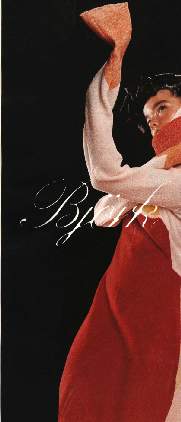 |
Back at the studio shoot, Bjork lets out an exasperated, "Whewl"
showing some skin as she peels off her costume."Wow, I'm starving," she says.
"Can we eat? What time is it?" Walking clumsily down a cobblestone
street in Manhattan's West Village, Bjork's orange pants, rhinestone-studded
top and platform shoes attract little attention from dining New Yorkers
more interested in their grub. Plopping herself down in a booth at a Mexican
restaurant, Bjork looks comical surrounded by pictures of Ernest Borgnine.
Scanning the menu, she orders mushroom fajitas and coffee, then leans intently
over the table as if to reveal a secret.
"I hope it's not stupid to eat now," she says. "I went drinking yesterday,
so my stomach is not in top state. I have to get off the alcohol."
Confessing ignorance regarding Ernest Borgnine
("And who are the Marx Brothers?" she asks), Bjork instead launches
into one of her favorite topics the proper care and feeding of electronic music.
Bjork Gudmundsdottir: You know, electricity and electronics should be
electronic, they shouldn't try to be like Japanese flute or violin. They should
be proud of what they are. Almost like sincere and honest techno noises,
'cause often people use them as cold and nasty. I think technology is very
warm and sentimental, as well. It can be very mushy and emotional. I wanted
Homogenic to reflect where I'm from, what I'm about. I wanted the beats to
be almost distorted; imagine if there was Icelandic techno. Iceland is one of
the youngest countries geograph cally, itÆs still in the making. So the sounds
would be still in the making.
Ray Gun: This is a darker, more minimal-sounding record than Debut or
Post. Would "reflective" and "melancholy" also be apt descriptions?
Bjork: The reason I called my first albums Debutand Post was because
it was like, "Bjork moves outside Iceland, travels the world, and works with
all these different people, blah, blah, blah." I knew it would take two albums;
Debut and Post are basically before and after. I produced myself this time.
I wanted to be me, not me visiting other places. Debut and Post were like
duet albums. Like me being turned on by Nellee Hooper and vice versa, or
like writing songs with Tricky or Howie B or Graham Massey. This is more me.
RG: It sounds like you've taken the Bollywood strings from Talvin Singh
and Tricky's beats and made them your own.
Bjork: I'm very open to learning and I love influences. But if you've got
a strong sense of identity you can mingle with aliens and you'll still be yourself.
With everyone I've worked with, was a big give and take. I've had working
relationships for 20 years, it's a very sensitive thing, like friendships.
If you have friends for a long time its not about publishing or credits,
it's about an emotional connection. You gave and took, there is a certain
equality there.
I've played keyboards since I was a kid and with the Sugarcubes. Those sort
of chord structures and strings in "Joga" (from Homogenic) are my chord
sounds. But I learned from everyone. I definitely learned from Tricky, but
not about beats. With Tricky, it's the relationship he has with his songs.
It's that abstract, you can't point it out. It was fascinating to watch him work.
Especially with how he focused on a song and the emotions, so it really isn't
just a song anymore. He has this outrageous faith in the focus point of the song,
its like meditation. It doesn't matter if there's no logic in the lyrics, or in the music.
It's still that faith. I respect him very much for that.
And my beats? It's just my character, really. I wanted raw hardcore beats.
And for the strings, I didn't want any basslines. No insides, no guitars, chords,
nothing When you've got a bassline, everything else falls asleep, like creativity.
When a bassline can get a song going, for the rest of it you don't push yourself.
If you have to work a song like that, itÆs harder Bllllllbbbhhhh (makes blabbering
sound, exasperation).
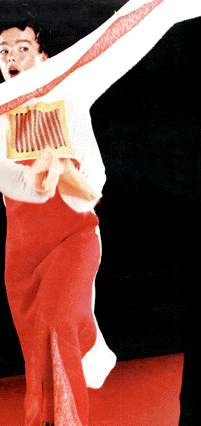 |
As if baring her soul to find her psyche, Bjork couples unusual textures with
dark emotions on Homogenic.
'The Hunter' evokes an eerie terrain with rolling techno beats and strings
penetrating the air like a toxic fog.
'Immature' sports a luminous glow not unlike the work of her former
boyfriend Goldie, the tune bouncing over a hypnotic piano melody and Bjorks
plaintive wail.
In 'Joga,' she sings of being in 'a state of emergency' over squishy, moonwalking
rhythms and romantically swaying strings. Most of Homogenic (outside of one
epic, fully-orchestrated track originally titled 'Bertolucci') repeats this formula
of sparse arrangements.
The mournful 'So Broken' shows Bjork at low ebb, screaming Yoko-like over
dueling Spanish guitars that seem to mock her honest revelations.
Similarly, 'Unravel' describes a collapsing relationship with the grace of a pensive
chamber group, as a church organ weaves a melancholy melody over crunchy
Tricky-ish beats. While Bjork seeks an answer through this daring simplicity,
she creates a personality miles away from the darling pixie image weÆve known.
|
Bjork: I know it sounds crap, but this album is the most me yet But my
friends tell me not to fool myself. The only thing that will surprise people
from me is if there are no surprises. I don't really care. I'm on this mission to
get all this shit out of me that I was born with and just learn to express it I feel
like I'm only ten percent there. Ninety percent is the songs I hear in my head.
I don't even know how to express them, let alone record them and play them
for other people. I'm trying to learn so badly before I die. I've got like 50 years.
RG: Why so minimal?
Bjork: This is just one flavor. It's easy to hold people's attention if you
keep changing the instruments. Like, if you've got 73 trombones, then a harp.
It's easy if you've got all these tricks. But to do it with nothing- it's hard.
If you listen to Tracey Thorn's first solo album, it's just her and a guitar, yet
you still get all the emotions. That's very challenging. Its also just me trying
to be truthful. I could play these songs on a ghetto blaster this summer when
I go camping in Iceland. I could put them on a mountain and play them out
without being ashamed. It will go with the countryside.
Where in the past Bjork sang lyrics that could've come from the mouths
of whimsical fairies and protective angels, Homogenic resembles the Id-baring
revelations of Primal Scream therapy. In fact, Homogenic resembles John Lennon's
Plastic Ono Band period, when he searched for meaning and depth in music by
paring back to piano, bass and drums. But don't tell that to Bjork. She likes Yoko, not John.
RG: The lyrics on Homogenic are rather reflective.
In 'Years,' you say, 'I'm so bored with cowards who say what they want,
but can't handle it. You can't handle love. I dare you.' What is that about?
Bjork: When I was finishing Post, I started singing this. Well, I didn't
know how I was going to feel. But it's like Bjork leaves Iceland-it's like a
Tin Tin book-and goes to these other countries. Bjork in America, Bjork
in Congo. I knew I was going to go on a mission, which was very hard for
me 'cause I'm a very family-oriented person and though people may
think I'm raving mad - and I probably am - I've always had basic, little
village upbringing. It was scary to leave all that. I was on a four-year
mission, I became an action junkie. If something didn't happen for
two hours I'd make a call, cut a deal, it was really sick. I wanted action,
to have this feeling like I'm risking everything or I'm bored.
Then last September everything exploded. My unconscious had asked for that.
A lot of things ended in my life. I went to Spain in the same week and
crashed. I'd been holding mV breath in London for four years.
Emotionally, this album is about hitting rock bottom and earning your way up.
So it's the darkest album I've done emotionally, but it's got a lot of hope.
'Okay, I'm on the bottom but I'm fucking going there.' It's the darkest, but the bravest.
RG: The song 'Pluto' almost sounds ghoulish. That line 'I just have to explode
this body off of me.' It sounds like you're giving birth.
Bjork: It's about getting plastered, that need to destroy everything so
you can start over again. Having a lot in the planet Pluto, which I do, means
you want to cut the crap, throw all the rubbish away No extra baggage. It's
death and birth.
RG: In 'Immature,' you sing, 'How could I be so immature to think
that he could replace the missing elements in me.'
Bjork: Then, 'How extremely lazy of me.' (giggles)
RG: Isn't the perfect relationship about filling in those holes in
each other, so that two people become one?
Bjork: Yeah, that's what I thought (sadly). But I don't know, really.
I used to have all these opinions about love because I'm fierce,
a helpless romantic. What happened is my expectations about romance
were there (motions to one side of the table, then the other), but
what was really happening was here. The elastic stretched so much,
it cracked. And now I'm more realistic about things.
I love so many people. Your mate doesn't have to replace everything.
I don't know and I'm not going to pretend I do. It's back to basics,
being self-sufficient. Now I'm back to how I was as a kid when I
used to spend most of my time alone. So I'm spending time by myself
and enjoying it very much. It sounds sad, but when I was a kid I didn't
really have friends. The most magical moments I had in my life I had alone.
Like climbing mountains or swimming or singing or listening to music.
RG: Why 'So Broken,' with just your voice and two flamenco guitarists?
Bjork: I would always write songs about happy things and keep my dirty
laundry to myself. I was brought up so self-sufficient and happy and
to never complain. Icelandic people are so furiously optimistic that
it's aggressive. So for me to write songs that are not happy is a bit abhorrent
You feel ashamed about it. The first unhappy song I wrote was 'Possibly Maybe.'
That was very hard for me. Usually I write all the time, but that was
like nothing happened for months. Then the song came out. I was ashamed
writing a song that was not giving hope.
|
In conversation, as in her music, Bjork gives her all. Practically leaning
into me, she constantly speaks with her hands. Gesturing, tracing outlines in the air,
tapping the table to make a point, she seems without enough limbs to express
her dizzying emotions. Frowning, rubbing her face, picking her nose, bending
her neck to work out a crick, you realize that far from being a space cadet,
Bjork is extremely down to earth. Not surprisingly then, she brings up the story
of the stalker who planned to end her life.
|
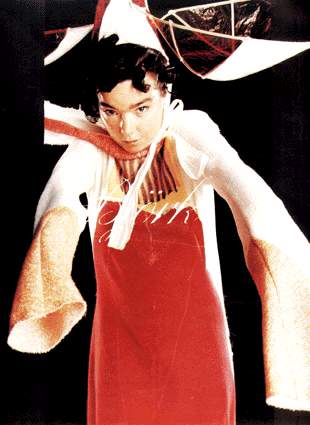 |
Bjork: I recorded 'So Broken' that infamous week for me, the week of the
bomb. The only way for me to write a song about it was just to take the piss.
I wrote it in my house hitting the table singing, 'I'm so broken (in corny,
overwrought voice), ole!' I was going to have the sound of washing dishes
and three kids screaming; it would be a soap opera. Then I went to the studio
in Spain and met the flamenco guitarist who plays on the track and stayed
there for six months recording.
RG: The stalker was sending you letters before the bomb arrived.
Did you read those letters?
Bjork: No. I never read my fan mail. I'm a lazy git and I don't think it's right.
I think I should play music and make songs and that's it. It's what's correct
and what's not correct. It's terrible to say it, but the best thing I could do
was to write more songs.
RG: The whole episode must have been very frightening for you.
Bjork: It was really, really scary. At that time I'd been traveling for four
years and I was actually in Florida when he shot himself. Just three blocks
away from him and he didn't know. It was a night where it was thundering
and lightning. So he sends the bomb to England and I fly over to London
while the bomb is on its way. I'm coming home and it really fucked
up my whole life and the idea of what my home is. Forty media people
were hanging outside my house with a lens on my toilet seat. I didn't feel
very welcome at my own home. Of course, I cried for the man and I was
very upset over his death. I couldn't sleep ...for him. But for me it destroyed
my home. I had to rediscover everything. Me and my son, Sindri, talked a
lot about it. Now home is when we meet, wherever we are. Home is where the heart is.
Though Homogenic's twisted rhythm panoply doesn't include
drum 'n' bass, Bjork is a regular visitor to London's Blue Note club,
particularly the Anokha nights led by Indian percussionist-arranger-producer
Talvin Singh, who has worked often with Bjork. She has been an outspoken
proponent of drum 'n' bass, bodysurfing the surge while many pop stars are still testing the waters.
RG: You've been into drum 'n' bass for several years. Can electronic
music break into the mainstream?
Bjork: Of course it can. Electricity is not just a phenomenon of the
20th Century. Its been around before us, it's like thunder and lightning.
There is electricity inside us. With acupuncture you're putting a needle on
the electrical current that travels in your nerves. Or you walk on a nylon carpet
and it pops when you touch the wall. It's just in this century that they made that
into audio. Now you can hear it. It's part of our lives.
People always think the future is alien and cold. Just before Noah's flood
they all said, 'The future is doomed, we're all doomed.' It's basically fear
of change. People saying 'techno is cold' is rubbish. Since when do you expect
the instruments you work with to deliver soul? You do music with computers
and get a cold tune, that's because nobody put soul into it. You don't look at
a guitar and say, 'Go on then, do a soulful tune'. You have to put soul into it
yourself. People are just lazy All cultures, like the Romans and the Egyptians,
the Pharaohs and all that shit, and the English and the Americans, they all have
climaxes, and they just want to stay there. A hundred years ago you had Great
Britain, which is hilarious if you think about the title. Can you imagine Great Iceland?
The climax for America was the '50s. They had this outrageous faith in
plastic and nylon and shampoo and tablets and Barbie and Ken.
And they discovered rock 'n' roll and they had really big cars. They want to
stay there, which is completely natural. That s when they were at their best.
So Americans want to stick to Levis and leather jackets and Elvis and rock 'n' roll.
They want to stay there and I don't blame them.
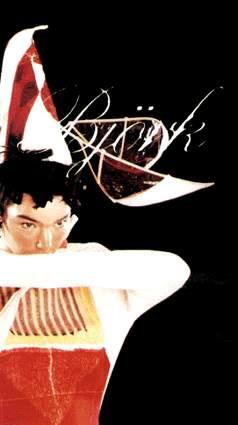 |
Bjork digs into her meal heartily, asking for more "nice" coffee.
The conversation wanders from her son (she doesn't know if she's
a good mom), the color purple (it makes her ill), Goldie (they were
never married), and Howie B (a laugh, then no comment).
|
RG: You've said before, "I'm a very spiritual person.
You can use the occult in many ways because there is more to
things than what we can see." What do you believe in?
Bjork: My son was all slippery about the spiritual world, so
I asked him, "What do you reckon moves the planets then?"
That says it all for me. A force of nature. That's what I think, it's
so obvious. My son says, "Gravity, so-and-so times three."
But I say "Uh-uh." It's so gorgeous.
What is a good day and what is a bad day? A bad day is when you're
out of that flow, or God or Buddha or nature or whatever you want
to call it. If you're a planet, you go on the right track, you won't
crash into the next one.
RG: You give emotions full reign in your music.
Bjork: Emotions weren't created to just lie around. You should experience
things to the full. I've got a sense of the clock ticking. We have to feel all
those things to the maximum. Like, I don't eat a lot but I really love
eating. And I like being precise and particular. There is a certain respect
in that. If you can do your day depending on how you feel, and enjoy things as well.
RG: Do you need a romantic relationship to feel grounded?
Bjork: I think so. I fiercely believe in family and friends and commitment.
Then you've got some comparison to freedom.
RG: You are the sign of Scorpio, the renowned sexual predator
Are you sexually adventurous?
Bjork: I don't know. I think I'm normal. Not normal, just healthy.
People's taste in sex is usually split into two categories. I call it rural
and urban. I'm definitely rural. Top of a mountain on a sunny day or
inside a forest is wonderful for me. But a lot of people like to be inside
a city wearing plastic and fishnet stockings. I love to fiddle with it, but
more out of curiosity And I want to be wide awake, completely sober,
completely alert, not sleepy.
Washing down her meal with a slurp of coffee, Bjork
absentmindedly cranks her neck from side to side, contorting her
face into a painful scowl. The crick won't leave. Having played the
Tibet Festival a few days earlier with an illustrious cast (and an eight-piece
string section), Bjork muses on the pious monks and her own, slightly more
earthy, character.
Bjork: I want to work on my character.
I think it's in there, a good person. I don't believe in just doing good things,
I want to feed my demon as well. One should learn to live both the demon
and the angel, you know? But I have a way to go. People excite me, they
turn me on. A new person can trigger things in you that you didn't even
know you had. If it's musical that's even better The unknown turns me on.
RG: Did you enjoy your performance at the Tibet Festival?
Bjork: I did, but I've been reading about reincarnation, and the Buddhists
say we come back as animals and they refer to them as lesser beings.
Well, animals aren't lesser beings, they're just like us. So I say fuck the Buddhists.
|
